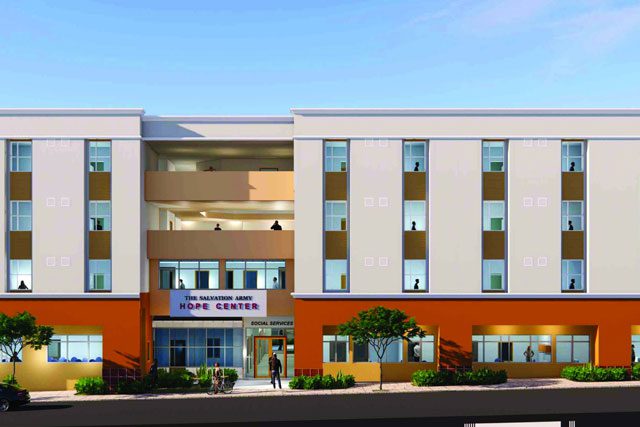Early one morning Kimberly Darian was almost to The Salvation Army Pasadena Tabernacle Corps to tell Corps Officer Captain Terry Masango she couldn’t take on the Hope Center capital campaign co-chair role she’d accepted— when what she saw gave her pause.
“I drove by the food pantry door and I saw a line of people waiting and the door wasn’t even going to open for two hours for their breakfast,” she said. “Once I saw that, I knew I had to do this. I had to make a difference.”
So she committed, and along with co-chair Mike Lee, is working with the Pasadena Tabernacle Corps and community to bring the Hope Center, a client choice food bank along with permanent supportive housing units for those facing homelessness, to Pasadena.
Despite the wealth associated with the city, Pasadena has many who are suffering from homelessness and poverty, Masango said. With the impact of COVID-19, the Pasadena Tabernacle Corps has seen the number of those asking for help triple.
“We have always had the passion to serve the people who are struggling, but when The Salvation Army leadership came up with The Way Out [plan to fight homelessness] and the City of Pasadena came up with something to end homelessness, all of that came at the same time,” Masango said. “We believe God’s hand was in it.”
The project is the second food bank project Masango has worked on, and is close to his heart. After growing up in abject poverty in Zimbabwe with childhood memories of going to bed hungry, he is dedicated to helping those in similar circumstances.
“I’m passionate about providing food banks so kids like me, who go to bed hungry, who are too weak to concentrate—we can provide meals for them so they can be healthy, participate in school and become good citizens in the future,” he said. “We live in the richest country in the world and we should do something to help.”
The proposed four-story building’s first floor will primarily house the Army’s social services offices, where services including emergency food and clothing assistance, counseling and service referral will occur. Floors two through four will include 65 new permanent supportive housing studio apartments for formerly homeless individuals. Residents will be engaged in case management and be connected to services that promote housing stability.
“We can’t help as many people as we’d like here in Pasadena because we just don’t have the facilities, so the Hope Center will correct that,” said Lee. “It is estimated that we will be able to help twice as many people with the new facility than what we have now, and this will help people that are in need to not become homeless.”
The Hope Center is seeking two major sources of funding. Private funding will cover the construction of the food bank and social services portion of the facility, with government funds contributing to the permanent supportive housing floors. According to Masango, the Army needs to raise $4 million by December to stay on track, and, at the time of publication, it was $1 million short of reaching the goal.
“We are almost there. We are very excited,” he said. “We have received a lot of support from the community. We feel confident we will reach our funding goal by the end of December, if not sooner.”
In addition to financial support, the Army has received letters in support of the Hope Center from community stakeholders and has seen support in various public hearings. The City of Pasadena has given $2 million toward the permanent supportive housing aspect of the Hope Center.
The Army hopes to demolish the current building in May 2021 and begin the projected 12-14 months of construction, aiming for project completion in the summer of 2022.











